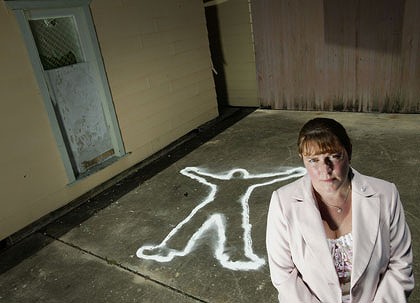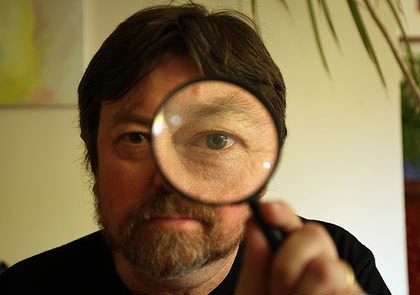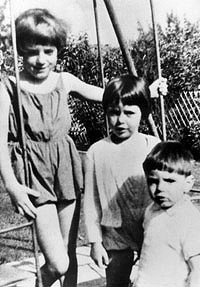 |
|
Sixth
sense ... Debbie Malone has assisted with more than 20
cases. Photo: Quentin Jones |
The official line is that police do not seek help from people claiming
to be clairvoyants - but the pressure to solve crimes can lead to a
softening of the rules, writes Kim Arlington.
It was a case that made international, albeit slightly sardonic,
headlines.
''Psychic finds wrong corpse,'' reported Britain's favourite tabloid,
The Sun. ''At least
someone was found,'' the
New York
Daily News conceded.
In August, a fortnight after six-year-old Kiesha Abrahams went missing
from her Mount Druitt home, a ''hunch'' led an Aboriginal elder to
bushland in Sydney's west.
 |
Still missing ... Kiesha
Abrahams.
|
There, in the Nurragingy Reserve at Doonside, Cheryl Carroll-Lagerwey
made a gruesome discovery: a human torso minus the arms, legs and head,
wrapped in plastic beside a creek.
The remains were not those of Kiesha but of Kristi McDougall, a
31-year-old mother who had disappeared two months previously. Two people
have since been charged with her murder.
Carroll-Lagerwey told police that a ''dream'' led her to the spot
 |
|
Tim
Mendham from Australian Skeptics. Photo: Tamara Dean |
At the time, the chief inspector of the homicide squad, Pam Young, told
reporters it was ''interesting that a woman had a sense or a feeling
that it was worth her while to come to this particular part of the
park''.
''For those who believe in such things, I understand that the woman
thinks that she might have some powers along that [psychic] line,'' she
said. ''We're still exploring that.''
Young added she had ''certain strong feelings about people who claim
they are psychic. I don't think it will help if we enter a discussion on
that.''
 |
|
Never
found ... the Beaumont children. |
Since then, however, other women claiming psychic insight have become
involved in the search for Kiesha.
Jacqui Lees and Kara Folaumoeloa told
New Idea magazine the
little girl had contacted them ''from beyond the grave'', with their
spiritual intuition leading them to bushland near Kiesha's home.
Speaking with the
Herald,
Lees says she receives ''clues from spirit'' and that information she
picked up had resonated with members of Kiesha's family.
The official police line is that they do not seek help from psychics,
mediums or clairvoyants.
In 2006, the Australian Federal Police suspended a senior officer for
consulting a clairvoyant about a threat to assassinate the then prime
minister, John Howard. The officer resigned before an internal
investigation was finalised. An AFP spokeswoman says the force ''does
not condone the use of psychics''.
Their state counterparts have a similar attitude. The NSW State Crime
Command's homicide squad commander, Detective Superintendent Peter
Cotter, says the policy is ''that while NSW Police welcomes information
from members of the community on their cases, we do not consult
psychics''.
It seems, though, that individual officers do sometimes turn to
supernatural sleuths when leads run cold.
''Paying a psychic to do a policeman's job might not be something they'd
like to admit to doing,'' says the president of the Australian Psychics
Association, Simon Turnbull. ''That doesn't stop a lot of young police
detectives contacting psychics and building up relationships with
them.''
He believes psychics can play a useful role in investigations, providing
information that would not otherwise be found, but says ''there's not
much joy for them to contact the police''.
''They've got to explain why they know something. In the old days, they
would come under suspicion.''
Turnbull says psychic ability - the fine-tuning of intuition and
extrasensory perceptions - ''is not 100 per cent foolproof. It doesn't
work in the same way every time, which is one of the reasons sceptics
like to dismiss it as being unreliable.''
The executive officer of the Australian Skeptics, Tim Mendham, says
psychic ability has never been scientifically verified and warns that
when it comes to self-described psychics, people ''should be just as
sceptical as they are of used-car salesmen''.
There has never been a case where a missing person has been located
solely through ''psychic powers'', without information gathered from
another source, he says.
Mendham is particularly critical of mystics approaching vulnerable
families who have lost a loved one.
''A lot of people do put a lot of emotional and financial effort into
following these leads and nothing's come about,'' he says. ''It runs the
gamut from silly to very sad. You are interfering with these people who
are suffering greatly; they are desperate to find someone and the
psychic comes running … offering advice which is hopeless.''
The Australian Institute of Criminology advises the families of missing
people to avoid psychics, saying: ''Desperation can force people to
consider options they would never entertain in more stable times.''
It's something Don Spiers knows all too well. Since his daughter, Sarah,
disappeared in 1996 - a suspected victim of Perth's Claremont serial
killer - he has been ''hounded'' by up to 400 psychics and clairvoyants
offering cryptic clues to her whereabouts.
''They had my emotions on a roller-coaster,'' Spiers told
The West Australian in
2008. ''You'd be full of hope … and there'd be nothing. Why would they
want to make it worse for me?''
But Faye Leveson, whose son Matthew is missing, found that visiting
spirit medium Debbie Malone assisted her family as they sought answers
and struggled with their grief.
''No way in the world has she caused us any pain or sorrow - it's the
exact opposite,'' Leveson says. ''She's made no promises that she will
bring him home. No money's ever changed hands. She just offered to
help.''
Matthew Leveson was 20 when he disappeared in 2007 after leaving a
nightclub with his boyfriend, who was acquitted last year of his murder.
Faye Leveson tracked Malone down, thinking anything was worth a try to
find her son.
''She'd been waiting for me to contact her,'' Leveson recalls. ''Matty
had been speaking to her. She'd left her name with the police but the
police didn't bother to pass it on to me, which I was really cranky
about.''
The specific details Malone relayed about her son convinced Leveson she
was communicating with him. The information is too personal to share but
left her in no doubt Malone is ''able to sense things and see things and
talk to spirits''.
''She has definitely got a gift,'' Leveson says. ''There's things she's
told us that nobody else could have possibly known.''
Matthew has not been found but thanks to Malone, Leveson knows ''he's up
there [in heaven]; I know he's with me.''
''Maybe I'm silly,'' she says. ''But it's been a comfort to us. If she
finds him, we'll be forever grateful.''
One sceptic swayed by Malone's insights is former Lake Illawarra
detective Jeff Little. In 2005 he was investigating the murder of South
Coast woman Maria Scott when he saw Malone on the TV program
Sensing Murder, in which
psychics offer clues to unsolved murders. He contacted her, hoping she
might corroborate elements of the investigation.
Her information was so ''spot on'' that he included it in his brief to
the coroner and recommended her to the Missing Persons Unit.
Little, now retired, says police do use psychics, ''even though they
officially say they don't''.
''I just told [my superiors] I was going to do it and it wasn't going to
cost them any money,'' he says.
''It's like any investigative tool; even if you get information from the
public, you still have to support it with legal evidence.''
Little was surprised by Malone's accuracy. ''We gave her no information
whatsoever, only that we were investigating the murder of a girl. She
kept coming up with all these hits.''
Working with bracelets found on Scott's body, Malone told detectives
where and how she was found, identified where Scott was killed and gave
personal information about the perpetrator that proved correct.
''There's no other way she could have got the information she gave us,
unless she gets it the way she says she does,'' Little says.
After a miscarriage 19 years ago, Malone ''woke up and saw dead
people''. She says she has been involved in more than 20 investigations
at the request of police and does not charge for her assistance.
''I've been given this ability for a reason,'' she says. ''It's my way
of giving back.''
Critics ask why she cannot immediately zero in on crucial information,
such as the location of a body or the address of a killer.
Malone says it's an unrealistic expectation and if it was that easy,
''every psychic in Australia would be solving the case''.
Her visions may reveal how people have been abducted or murdered, or the
interaction between killer and victim. But she says it's about
interpreting the messages she receives, which can be symbolic rather
than literal.
Malone says she considers her special ability to be a tool for
detectives to use alongside their more conventional investigative
methods.
''I don't believe psychics solve cases,'' she says. ''Sometimes I may be
able to give [police] new insight into an area they haven't looked at.
''At the end of the day, if the information assists on the case, does it
matter where it comes from?''
Psychics and the conflicting body of evidence
Someone is reported missing in Australia every 15 minutes. Most are
found within a week but about 1600 are listed as long-term missing -
gone for six months or more.
They include the Beaumont children - siblings Jane, 9, Arnna, 7, and
Grant, 4 - who disappeared from Glenelg Beach in Adelaide on Australia
Day, 1966.
A renowned (some would say infamous) Dutch psychic, Gerard Croiset - who
had reportedly located missing children in Europe - became involved in
the case, offering clues from overseas to find the children.
When his hints led nowhere, Croiset was flown to Adelaide in November
1966, at the expense of a local businessman and a Beaumont family
friend. He told police to dig for the children under the newly concreted
floor of a warehouse built on an old brick factory, then left the
country.
The police command advised against the dig; the government refused to
fund it. A public committee raised $7000 for the excavation but nothing
was uncovered.
High-profile missing persons cases tend to attract a flood of
information from self-proclaimed psychics. In the case of
Madeleine
McCann, the three-year-old British girl who disappeared on a
family holiday to Portugal in 2007, investigators have reportedly
followed up 150 leads from mystics worldwide.
The executive officer of the Australian Skeptics, Tim Mendham, says such
information was self-evidently useless, otherwise Madeleine would have
been found - and the same applied for every other unsolved
disappearance.
So how to explain the discovery of Kristi McDougall's body by Cheryl
Carroll-Lagerwey, who dreamed she would find Kiesha Abrahams at the
spot?
A Queensland research psychologist, Kathryn Gow, has analysed psychic
readings for 20 years and is convinced a small number of psychics have a
genuine ability. She suggests that as an Aboriginal elder, Carroll-Lagerwey
was ''in contact with the basic elements of life and therefore can
probably sense what has happened in an environment''.
The president of the Australian Psychics Association, Simon Turnbull,
thinks it likely that ''at that particular event, where a body was
waiting to be found, there was an obvious case of confusion to do with
the psychic identifying the body''.
Mendham says it may be ''a strange coincidence''.
''Unfortunately bodies do get found in the bush,'' he says. ''She found
a body - that's all we know for sure.' |





